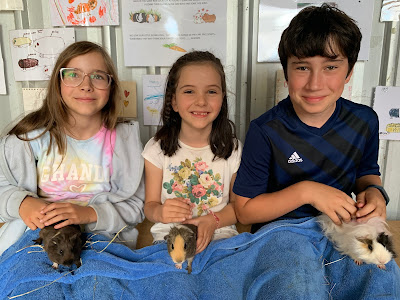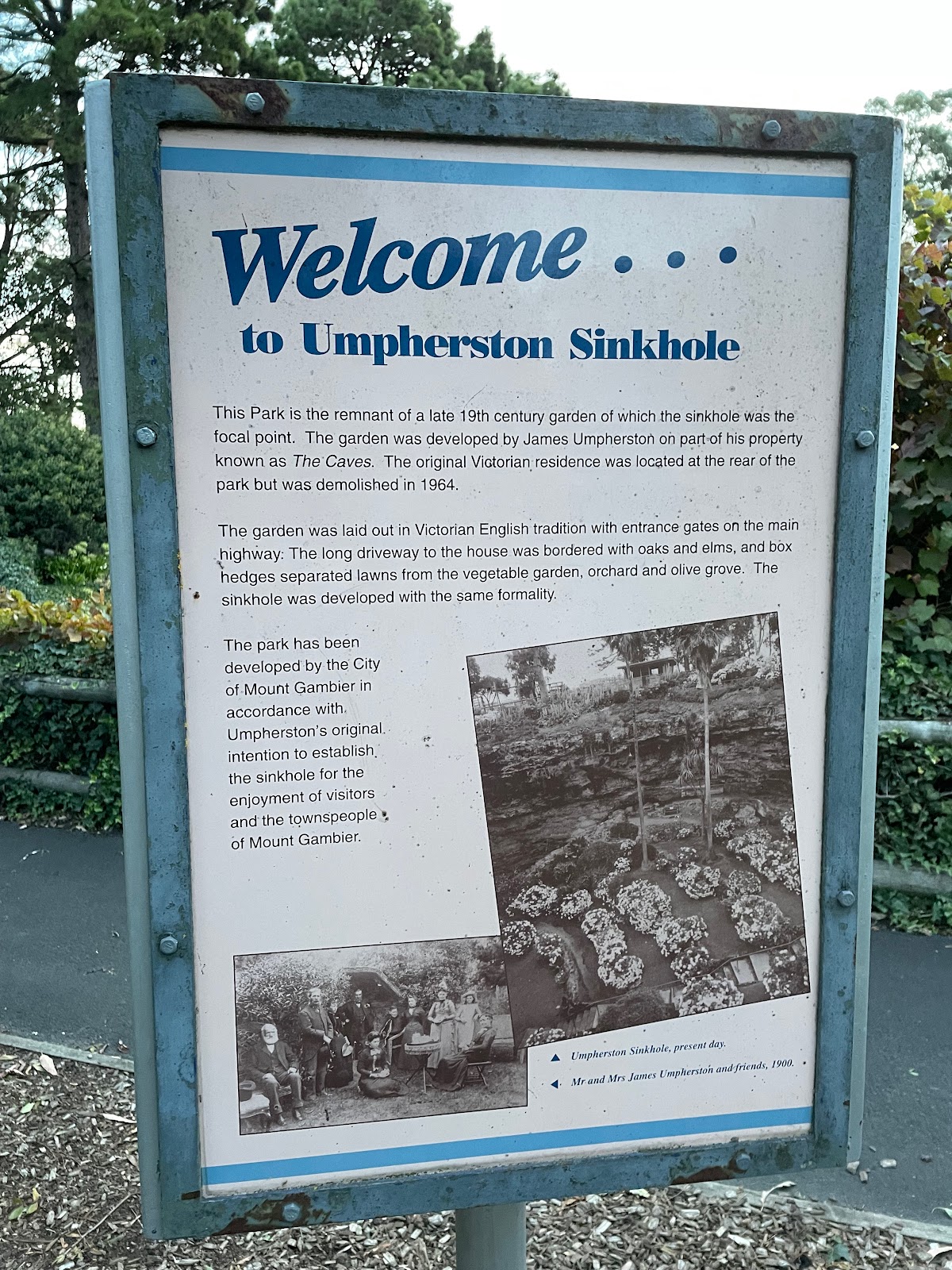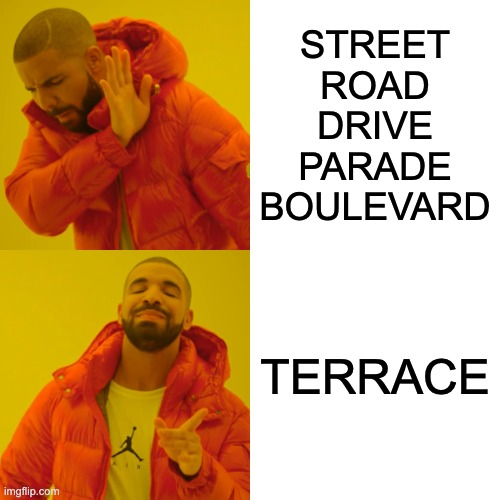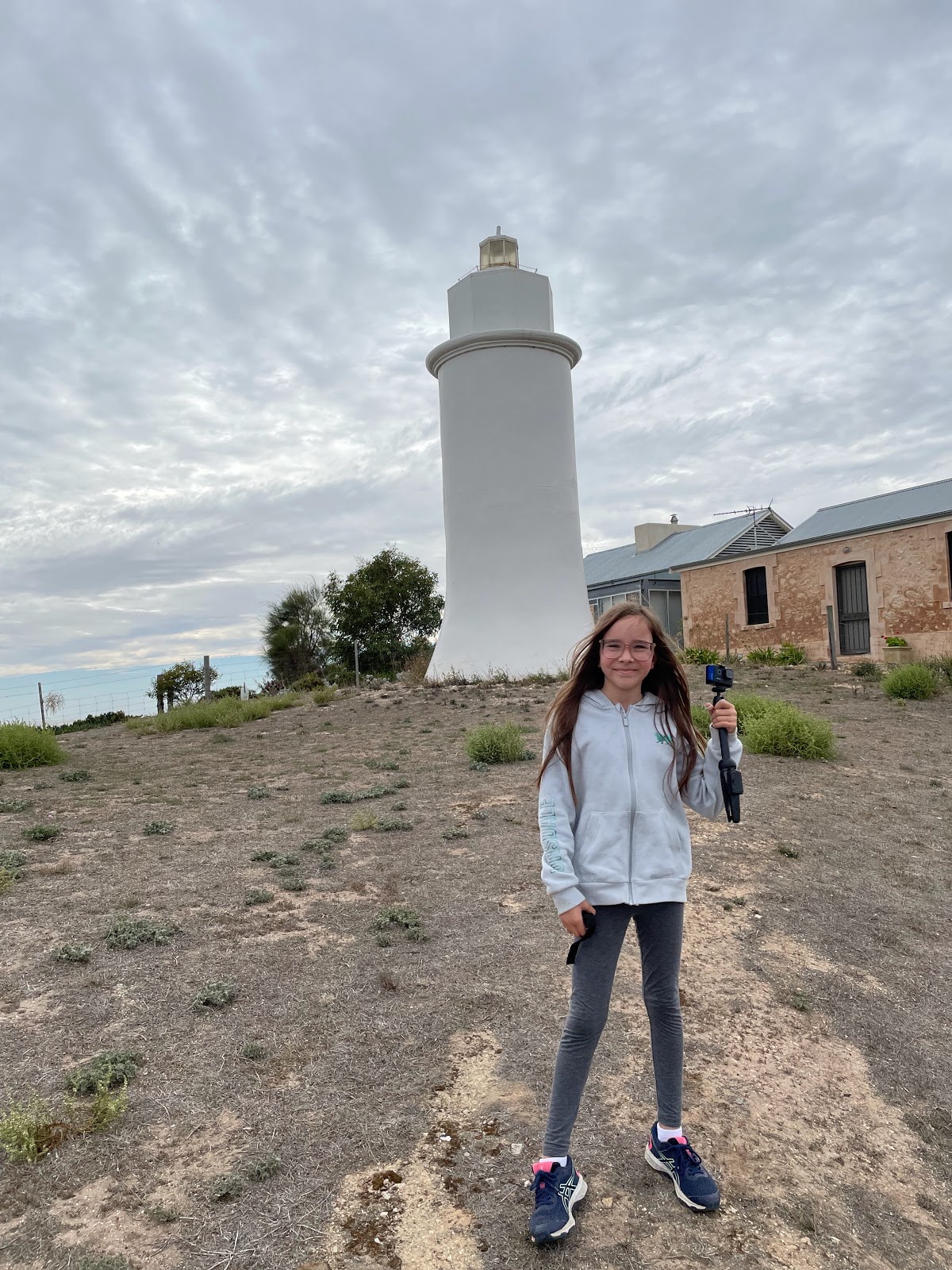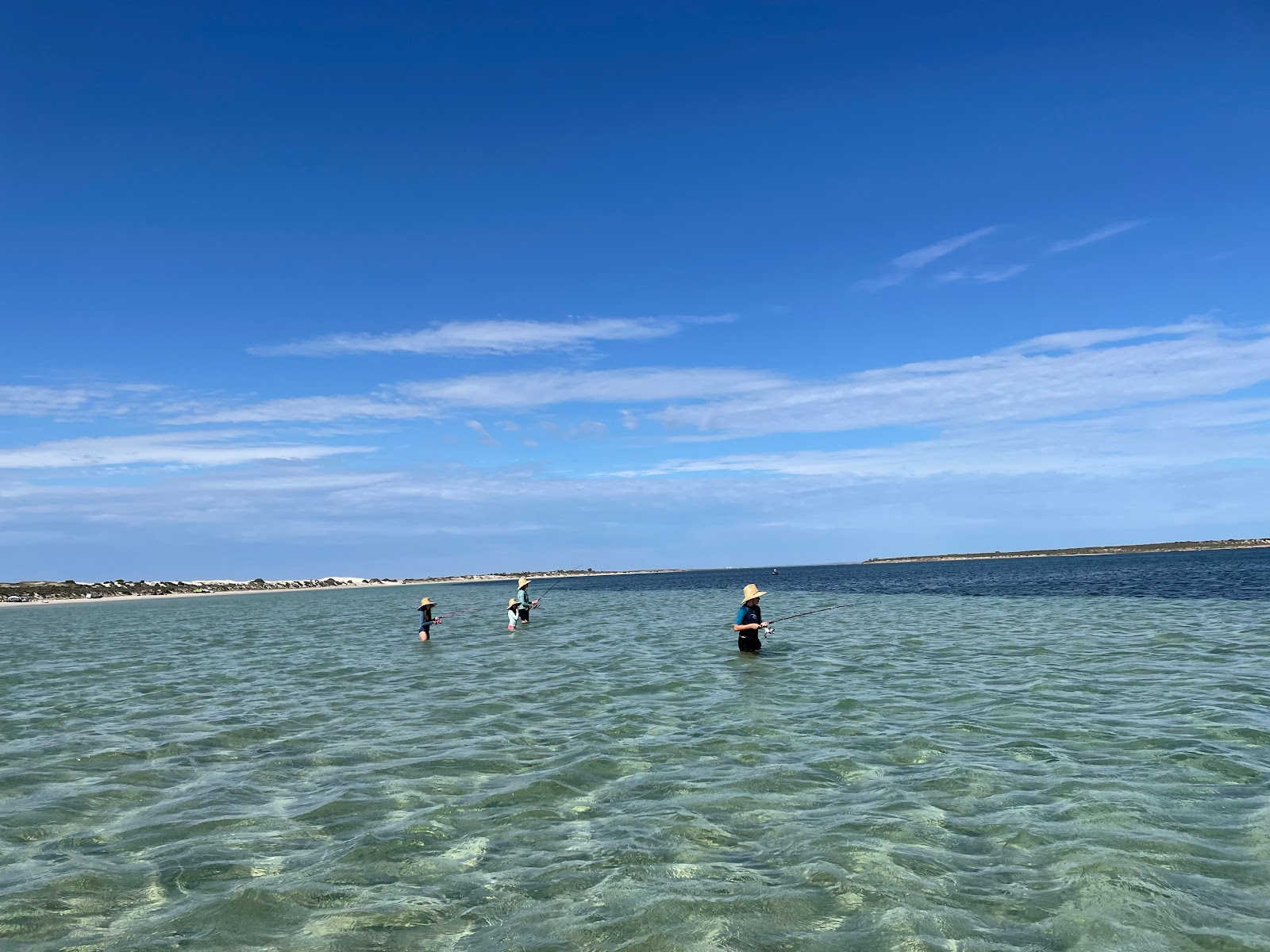Halfway across the Nullabour Plain, one of the great frontiers of Australia, if not the world, we had arrived at the South Australia / Western Australia border. We had stopped at the aptly named Border Village to fill up with fuel and clean out the portaloo, when lo and behold a familiar voice shouts out "Michelle!". It was Rowan Prendagast, an old mate from the Army reserve, who was off on a similar trip with his wife Sarah and kids Alby and Molly. We hadn't seen each other in years, so it was great to catch up and talk about the big half lap.
 |
| Prenda and Brock at Border Village |
We kept driving, as you do, until the road heads back up the escarpment at the Madura roadhouse, where we saw a truck hanging precariously over the edge of the cliff, the cab hanging freely, although counterweighted by the 2 trailers it was towing. There's basically 2 kilometres of dangerous road on the Eyre Highway in maybe 1600 and this bloke picked the 0.125% of the road to fall asleep or drop his coffee or whatever caused him to take a sharp left turn off the cliff. Luckily it would only be a short walk back to help, however I'm sure the recovery team would have been scratching their heads on how to retrieve the truck.
That was the most exciting thing to happen that day, The Skylab museum at Balladonia and the eagles at the Cocklebiddy roadhouses notwithstanding.
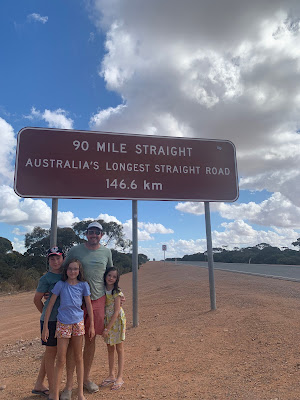 |
| Notable, but not interesting per se |
Actually the Skylab thing is pretty interesting. In 1979 the US had space station Skylab was being bought back to earth in a somewhat less than controlled fashion, when it missed the Indian Ocean and instead crashed near the Balladonia roadhouse (I'm not entirely certain how near "near" is in this case, out there anything within 100kms is probably "near"). They have a huge mock space station piece sticking out the roof of the Roadhouse and and very comprehensive museum including news reports and stories from the locals. It certainly caused a fuss and the US State Department was issued with a $400 fine by the Shire of Esperance for littering.
Finally exiting the Nullabour, we camped that night we camped with Prenda and the family in the Fraser Range having a fire and another good old chat.
From there we headed into the Goldfields, staying at Kalgoorlie for 3 nights and enjoying the sights of a town where they literally paved the roads with gold (waste pyrite from mining, which was thought to be worthless until some American showed up who knew the process for extracting the gold cheaply).
Kalgoorlie is a funny place and deserves its own full length blog post, so I will mostly ignore it here. We visited the Super Pit and the Hannans North Tourist Mine, ate noodles at Xings Sushi and Noodle and more or less tried to clean the dust of the Nullabour out of our camper.
 |
| Kalgoorlie Super Pit |
From there we turned south for the coast, heading down to Esperance, a beautifully located town with a sweeping harbour foreshore. It was Sara's Birthday on Easter Sunday there, so we spent the day exploring town, eating ice cream at McDonalds, going to the cinema (watching The Bad Guys - 4 out of 5 stars!) and eating dinner at the best restaurant in town.
The next day we were headed to Lucky Bay, a campsite in the Cape Le Grande National Park. Now this is a place to camp!
 |
| Lucky Bay Beach |
Lucky Bay is sited on a large protected bay, named by Matthew Flinders, I guess because he needed a good harbour in a storm and found this before his boat sank. We were lucky to stay there too, bookings in the school holidays were hard to come by, but Michelle was very organised, booking the site 6 hours after the reservations opened. There's solar powered showers, long drop toilets (a bit stinky if the wind came from the wrong direction) and access to one of the nation's great beaches. I don't know what it is about this part of WA, but all the beaches are gleaming white with amazing turquoise waters, abundant marine life and more incredible views than you can shake a stick at. We hiked over to the adjacent bays, climbed Frenchmans Peak, fished, snorkelled and fished some more. All in all we spent a very relaxing 4 days there.
From Cape Le Grande we had another epic driving day, travelling 600km to Denmark. The grasslands and farms of Esperance slowly gave way to woodlands, which ended up in actual forests with perennial rivers, a first for some time, maybe since we'd left the Barossa Valley. Due to a crash on the highway we skipped Albany, instead driving through the Stirling Ranges to Denmark via Mt Barker. Denmark seemed like a different country, almost like be transported back to Anglesea or Aireys Inlet, with lush green forests, towering trees and green grass.
We explored the surrounds for a few days, with a brief interruption of the first serious mechanical issue of our trip - the door fell off.
Good Morning to everyone except the Jayco engineer who designed the door on the Swan Outback.
— Brock Mills (@stringy_05) April 23, 2022
Somehow the load on the door had overcome the approximately 8mm2 of 0.5mm plastic and the hinges had pulled through. I spent the Saturday morning fixing it, my approach being somewhat cavalier after searching "Jayco Albany" on Google Maps, ringing Caravanland, and finding out they had the part I needed for $30. "No worries I break this bit then" I thought to myself and proceeded to remove it, only breaking it 3/4 in half. Little did I realise I had spoken to Caravanland in Perth, on the Albany Highway, so I would not be nicking down there later that morning, given it was a 5 hour drive. Despite this, I had enough of a door frame to work with, so it was up to the hardware store for some parts and silicon and it was all back on by 1pm. It fell off again the next day, so I fixed it properly that time but things are always easier the second time around!
We headed down to Albany, spent some time at the excellent National ANZAC Centre, shopping at the first Aldi we had seen since day 2 and visiting the lookouts and blowholes at the wild southern coast.
Next stop was Margaret River - only a lazy 340km or so from Denmark. We drove there through the magnificent Karri and Jarrah forests, visiting the tree top walk at the Valley of the Giants and climbing part way up the Gloucester Tree in Pemberton. Hamish says he would have gone all the way to the top, however I didn't fancy trying to coax a child down at the same time as dealing with my own precarious descent.
We got into Margaret River in the early evening just as the rain started to set in, something that would be a feature of the next few days. We were staying out of town at the Big Valley Campsite, which is a caravan park on a working farm. The big drawcard is getting to play with a few of the 300 or so Guinea Pigs that are resident on the farm, which the kids thought was the bees knees. There was also feeding the sheep in the afternoon, which was also great fun.
We did all the things you are meant to do in Margaret River, except go to a winery or get out of the car in the actual town of Margaret River. We went to look at Cape Leeuwin Lighthouse, however it is in the process of being renovated, so it was entirely wrapped in scaffolding and some sort of hessian.
We went to Hamelin Bay to see the Stingrays and did actually see one, although it was so windy we couldn't sit around there for long. We had coffee and cake in Augusta, and afterwards bought secondhand books at the Lions Bookshop while avoiding the rain. We went to the Mammoth Cave, where we raced a bus load of old people through the cave. We went to the Indijup Natural Spa and had lunch at the Margaret River Brewery and the kids played wth the guinea pigs and fed the sheep again. We went to the Busselton Jetty, but frankly couldn't be convinced to walk all the way out to the end, so instead the kids played at the pirate ship playground and Michelle and I had a coffee. All in all we had a lovely time, if a bit soggy, and were suitably refreshed and ready to head into the first big city we'd seen since leaving home - Perth!
We were pretty excited about Perth. We were staying in an Airbnb, so the prospect of a real bed and a dishwasher was enticing. My Uncle Rod, his wife Alana and his sons (ie, my cousins) Scott and Cameron all live in Perth with their wives Lauren and Nicole, the family rounded out by Scott and Lauren's children Jackson and Sienna, who are a similar age to our kids. Rod's 70th birthday was imminent and Scott and Lauren were hosting a party at their house in East Fremantle on the Saturday night. My parents were also attending, along with my aunt Genief. Mum and Dad and Gen were all staying with us on the Friday and Saturday nights so we had a great opportunity to catch up with family we don't see very often and family that we see all the time, but have missed since we left home.
We arrived in Perth on the Thursday, getting settled enough to head out for dinner with Scott, Rod, Alana, Cameron, Nicole, Jackson and Sienna at a local Italian restaurant in Bicton. Friday was spent getting X-rays (Michelle's foot, which she had hurt in Mt Gambier and was still not right), buying spares for the camper and visiting the tourist sites in Fremantle. I picked up Mum and Dad from the airport in the evening and we all had pizza for dinner.
On Saturday we went out for brunch by the river in East Fremantle, visiting Scott and Lauren's magnificent house and driving down memory lane with Dad as we visited the areas where he and Mum lived in the early 1970's. The 70th Birthday party was an absolute corker, a catered affair in Scott's backyard with some superb food from Perth restaurants, the Brisket Pastrami and Corn Bread being 2 highlights for mine. We had a great time, however we didn't have time to sit still. The next day we were back on the road to the 3rd phase of our trip - the road from Perth to the Kimberley.




